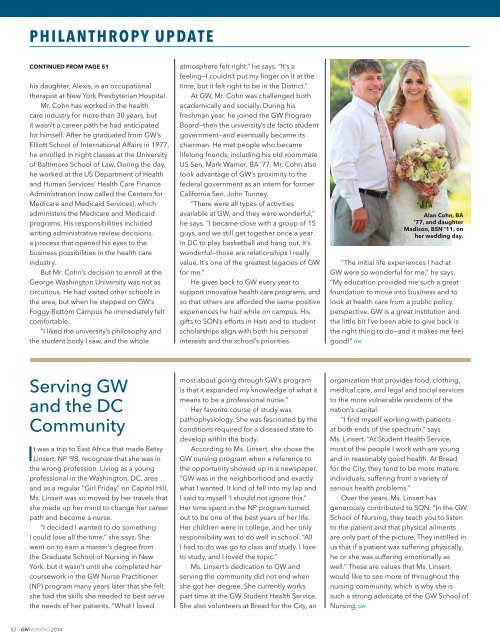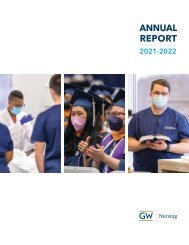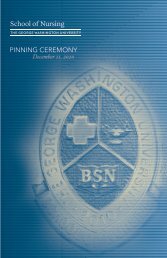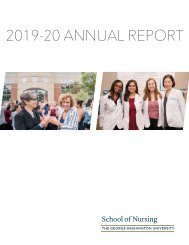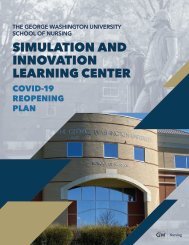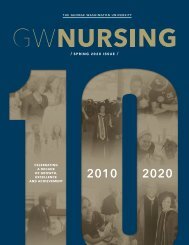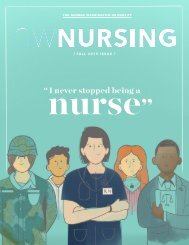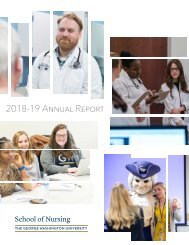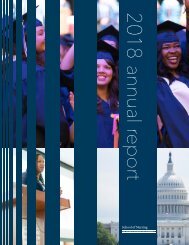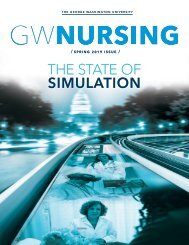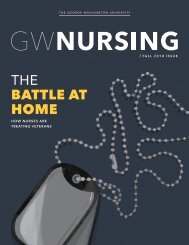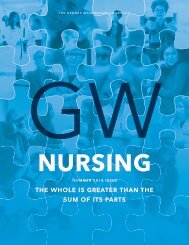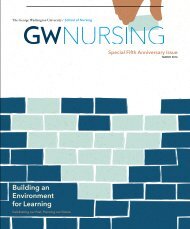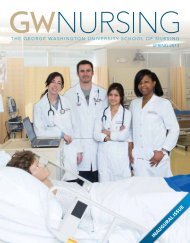GW Nursing Magazine 2014
GW Nursing is a publication of the George Washington University School of Nursing. The magazine tells the story of GW nurses and their endeavors in the areas of education, research, policy and practice.
GW Nursing is a publication of the George Washington University School of Nursing. The magazine tells the story of GW nurses and their endeavors in the areas of education, research, policy and practice.
Create successful ePaper yourself
Turn your PDF publications into a flip-book with our unique Google optimized e-Paper software.
PHILANTHROPY UPDATE<br />
CONTINUED FROM PAGE 51<br />
his daughter, Alexis, is an occupational<br />
therapist at New York Presbyterian Hospital.<br />
Mr. Cohn has worked in the health<br />
care industry for more than 30 years, but<br />
it wasn’t a career path he had anticipated<br />
for himself. After he graduated from <strong>GW</strong>’s<br />
Elliott School of International Affairs in 1977,<br />
he enrolled in night classes at the University<br />
of Baltimore School of Law. During the day,<br />
he worked at the US Department of Health<br />
and Human Services’ Health Care Finance<br />
Administration (now called the Centers for<br />
Medicare and Medicaid Services), which<br />
administers the Medicare and Medicaid<br />
programs. His responsibilities included<br />
writing administrative review decisions,<br />
a process that opened his eyes to the<br />
business possibilities in the health care<br />
industry.<br />
But Mr. Cohn’s decision to enroll at the<br />
George Washington University was not as<br />
circuitous. He had visited other schools in<br />
the area, but when he stepped on <strong>GW</strong>’s<br />
Foggy Bottom Campus he immediately felt<br />
comfortable.<br />
“I liked the university’s philosophy and<br />
the student body I saw, and the whole<br />
atmosphere felt right,” he says. “It’s a<br />
feeling—I couldn’t put my finger on it at the<br />
time, but it felt right to be in the District.”<br />
At <strong>GW</strong>, Mr. Cohn was challenged both<br />
academically and socially. During his<br />
freshman year, he joined the <strong>GW</strong> Program<br />
Board—then the university’s de facto student<br />
government—and eventually became its<br />
chairman. He met people who became<br />
lifelong friends, including his old roommate<br />
US Sen. Mark Warner, BA ’77. Mr. Cohn also<br />
took advantage of <strong>GW</strong>’s proximity to the<br />
federal government as an intern for former<br />
California Sen. John Tunney.<br />
“There were all types of activities<br />
available at <strong>GW</strong>, and they were wonderful,”<br />
he says. “I became close with a group of 15<br />
guys, and we still get together once a year<br />
in DC to play basketball and hang out. It’s<br />
wonderful—those are relationships I really<br />
value. It’s one of the greatest legacies of <strong>GW</strong><br />
for me.”<br />
He gives back to <strong>GW</strong> every year to<br />
support innovative health care programs, and<br />
so that others are afforded the same positive<br />
experiences he had while on campus. His<br />
gifts to SON’s efforts in Haiti and to student<br />
scholarships align with both his personal<br />
interests and the school’s priorities.<br />
Alan Cohn, BA<br />
‘77, and daughter<br />
Madison, BSN ‘11, on<br />
her wedding day.<br />
“The initial life experiences I had at<br />
<strong>GW</strong> were so wonderful for me,” he says.<br />
“My education provided me such a great<br />
foundation to move into business and to<br />
look at health care from a public policy<br />
perspective. <strong>GW</strong> is a great institution and<br />
the little bit I’ve been able to give back is<br />
the right thing to do—and it makes me feel<br />
good!”<br />
Serving <strong>GW</strong><br />
and the DC<br />
Community<br />
It was a trip to East Africa that made Betsy<br />
Linsert, NP ’98, recognize that she was in<br />
the wrong profession. Living as a young<br />
professional in the Washington, DC, area<br />
and as a regular “Girl Friday” on Capitol Hill,<br />
Ms. Linsert was so moved by her travels that<br />
she made up her mind to change her career<br />
path and become a nurse.<br />
“I decided I wanted to do something<br />
I could love all the time,” she says. She<br />
went on to earn a master’s degree from<br />
the Graduate School of <strong>Nursing</strong> in New<br />
York, but it wasn’t until she completed her<br />
coursework in the <strong>GW</strong> Nurse Practitioner<br />
(NP) program many years later that she felt<br />
she had the skills she needed to best serve<br />
the needs of her patients. “What I loved<br />
most about going through <strong>GW</strong>’s program<br />
is that it expanded my knowledge of what it<br />
means to be a professional nurse.”<br />
Her favorite course of study was<br />
pathophysiology. She was fascinated by the<br />
conditions required for a diseased state to<br />
develop within the body.<br />
According to Ms. Linsert, she chose the<br />
<strong>GW</strong> nursing program when a reference to<br />
the opportunity showed up in a newspaper.<br />
“<strong>GW</strong> was in the neighborhood and exactly<br />
what I wanted. It kind of fell into my lap and<br />
I said to myself ‘I should not ignore this.”<br />
Her time spent in the NP program turned<br />
out to be one of the best years of her life.<br />
Her children were in college, and her only<br />
responsibility was to do well in school. “All<br />
I had to do was go to class and study. I love<br />
to study, and I loved the topic.”<br />
Ms. Linsert’s dedication to <strong>GW</strong> and<br />
serving the community did not end when<br />
she got her degree. She currently works<br />
part time at the <strong>GW</strong> Student Health Service.<br />
She also volunteers at Bread for the City, an<br />
organization that provides food, clothing,<br />
medical care, and legal and social services<br />
to the more vulnerable residents of the<br />
nation’s capital.<br />
“I find myself working with patients<br />
at both ends of the spectrum,” says<br />
Ms. Linsert. “At Student Health Service,<br />
most of the people I work with are young<br />
and in reasonably good health. At Bread<br />
for the City, they tend to be more mature<br />
individuals, suffering from a variety of<br />
serious health problems.”<br />
Over the years, Ms. Linsert has<br />
generously contributed to SON. “In the <strong>GW</strong><br />
School of <strong>Nursing</strong>, they teach you to listen<br />
to the patient and that physical ailments<br />
are only part of the picture. They instilled in<br />
us that if a patient was suffering physically,<br />
he or she was suffering emotionally as<br />
well.” These are values that Ms. Linsert<br />
would like to see more of throughout the<br />
nursing community, which is why she is<br />
such a strong advocate of the <strong>GW</strong> School of<br />
<strong>Nursing</strong>.<br />
52 <strong>2014</strong>


